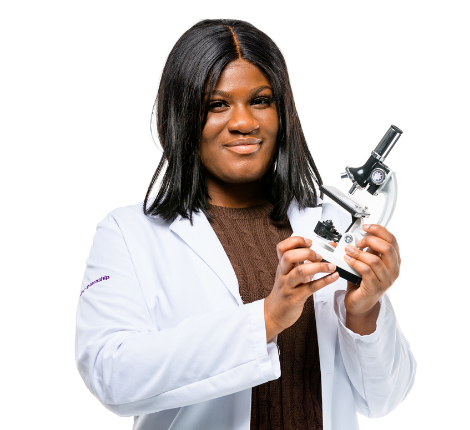For Princess, it started in early 2020, when she was a 17-year-old senior in high school: she had a pain in her chest, pain that eventually got so severe her parents took her to Hartford Hospital Emergency Department. A scan of her chest showed a mass about three inches across, and a biopsy later revealed she had non-Hodgkins lymphoma. Hartford Hospital transferred her to Connecticut Children’s where she could get specialized care for pediatric cancer.
“When I found out that it was cancer,” Princess says, “I felt everything in me was sucked out. I felt like a ghost. I went numb.” The good news was that the cancer did not appear to have spread anywhere, and the only treatment necessary was chemotherapy. But for Princess, that chemo was brutal. “Honestly,” she says, “the cancer wasn’t the worst part of having cancer. It was the worst pain I’d ever been through in my entire life. I’m a child who doesn’t get hurt a lot. I’ve never broken a bone. So going from never being in any type of pain to doing chemo was shocking. I just had so much trouble describing it to my parents and my siblings. They would see me in so much pain, but not really understand it. I told them it felt like I had been in a fight with someone and I had bruises all over my body, but you can’t see them. It was invisible bruises, everywhere from head to toe.”
The drugs also produced severe nausea, bad enough that she would go without eating for days to avoid throwing up. The chemotherapy ended just as Princess was starting as a freshman at Southern Connecticut, and her first year there was challenging because of lingering side effects of the chemotherapy. But now she’s doing much better. She’s studying to be a pediatric nurse, and she’s joined the Pediatric Cancer Awareness Club, which raises money to sponsor a child with cancer each year and bring some joy into their lives.
She’s in remission and hopes to stay that way. She comes to Connecticut Children’s every three months for a full set of scans and blood tests, to make sure the cancer is staying quiet. “They don’t want to give me that false hope that it can’t come back,” Princess says, “because it could, but we’re trying to be hopeful. And I will hit that three-year mark, when I can switch to twice-a-year exams.”
